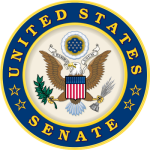- 産業: Government
- Number of terms: 4127
- Number of blossaries: 0
- Company Profile:
The United States Senate is the upper house of the United States Congress. The composition and powers of the Senate are established in Article One of the U.S. Constitution. Each U.S. state is represented by two senators, regardless of population. Senators serve staggered six-year terms.
A few days after a law has been enacted, it is officially published first as a "slip law. " Slip laws are unbound and printed on one or a few pages of paper.
Industry:Government
The maximum amount, established in law, of public debt that can be outstanding. The limit covers virtually all debt incurred by the Federal Government (primarily the Treasury Department), including borrowing from trust funds, but excludes some debt incurred by agencies.
Industry:Government
Designated "S. Res. ," simple resolutions are used to express nonbinding positions of the Senate or to deal with the Senate's internal affairs, such as the creation of a special committee. They do not require action by the House of Representatives.
Industry:Government
Informal term for a nongermane amendment to a bill or an amendment to an appropriation bill that changes the permanent law governing a program funded by the bill.
Industry:Government
A message sent to the Senate by the President or other executive branch official. Presidential veto messages are an example of an "executive communication. "
Industry:Government
The process by which congressional committees and subcommittees debate, amend, and rewrite proposed legislation.
Industry:Government
Spending (budget authority and outlays)controlled in annual appropriations acts.
Industry:Government
Senators appointed to serve on conference committees. They are also called "managers. " Conferees are usually appointed from the committee or committees that reported the legislation; they are expected to try and uphold the Senate's position on measures when they negotiate with conferees from the other body.
Industry:Government
Assistants to the floor leaders who are also elected by their party conferences. The Majority and Minority Whips (and their assistants) are responsible for mobilizing votes within their parties on major issues. In the absence of a party floor leader, the whip often serves as acting floor leader.
Industry:Government
